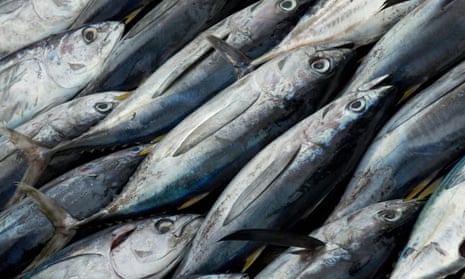The world’s biggest canned tuna brands are failing to tackle modern slavery in their Pacific supply chains, leaving thousands of workers at sea under threat of human rights abuses, a report has found.
According to findings published on Monday by the Business & Human Rights Resource Centre (BHRRC), an international corporate watchdog, only four of the world’s 35 largest tuna retail brands said they conducted due diligence with the specific aim of uncovering modern slavery in their supply chains.
Of the brands surveyed for the report who responded, only 20% said they had mapped out their supply chains in full, and just 8% stated that they require their subcontractors to enforce their modern slavery policies throughout their supply chains.
The report’s findings are likely to raise questions over claims by tuna brands that they are committed to tackling human rights abuses in their supply chains.
The Pacific Ocean is home to the world’s largest tuna fisheries, where catches amounted to $22bn (£17.3bn) in 2014. Nearly 60% of the world’s tuna comes from the Pacific alone, and consistent claims of human rights abuses of workers at sea – ranging from non-payment of wages and physical abuse to fishermen thrown overboard – have led campaigners to call for more stringent oversight by tuna companies.
“Modern slavery is endemic in the fishing industry, where the tuna supply chain is remote, complex and opaque,” said BHRRC’s Pacific researcher Amy Sinclair.
“Yet despite years of shocking abuses being exposed, tuna companies are taking little action to protect workers. This report finds that most tuna companies need to significantly step up their efforts to identify, address and prevent modern slavery in their supply networks and provide redress for workers in order to stamp out this abuse.”
The NGO contacted 35 canned tuna companies and supermarkets by survey between November 2018 and January 2019. Together, the companies and supermarkets represent 80 of the world’s largest retailed canned tuna brands, including Aldi, Bumble Bee Foods, Kroger and Thai Union Group.
The survey asked tuna companies about the human rights challenges, among them modern slavery, that they face in their supply chains. Only 20 of the 35 companies responded (their responses can be seen here). The NGO also reviewed publicly available information on the companies’ websites.
Although two-thirds of the companies that responded had corporate human rights policies, there was little to no action to implement those policies, the report claims. And despite recurrent reports of abuse at sea, not one company surveyed disclosed having found a single example of modern slavery in their supply chains, says BHRRC’s executive director, Phil Bloomer.
“That two-thirds of the companies [that responded] have human rights policies is good news, but without any action to address abuses, those policies are little more than window dressing,” said Bloomer.
“We’re talking about modern slavery in one of the most abusive sectors [in the world], where migrants are bought and sold at sea, transferred from one ship to another and never allowed to come back to land, and tossed overboard if they complain or are injured.
“There should be profound levels of concern [among companies]. Yet not one company said they had found a single person in modern slavery in their supply chain. This indicates that the sector really lacks the effort to understand the abuse in their supply chains.”
The report also found that, of the 20 companies that replied to the survey:
Only one company (Thai Union Group) outlined its due diligence procedure in detail
Only one company (Metro AG) identified the Pacific countries from which it sources its tuna
Only one company (Thai Union Group) mentioned engagement with a trade union
Just four companies (Thai Union Group, Kraft Heinz Australia, Target and Rewe Group) reported having due diligence policies and procedures that address the risk of modern slavery in their supply chains
Of the steps companies were taking to address abuses, nearly half of those that responded reported using social audits to meet due diligence requirements; one third were conducting human rights training; and one quarter reported engaging in digital traceability so that the contents of their canned tuna could be traced back to the original catch.
But companies continue to rely on third-party recruitment agencies to staff fishing boats and other jobs in their supply chain (only one company reported having oversight of its own recruitment process). Agencies often charge high recruitment fees, which can force migrant workers into debt bondage, a form of modern slavery.
Steve Trent of the Environmental Justice Foundation, which is publishing its own report on human rights abuses at sea on Wednesday, said BHRRC’s findings were commensurate with what he himself had seen.
“Although disappointing, these findings do not surprise me in the least. It has been abundantly clear for some time that more must be done, and must be done now. In particular, actions must include specific measures to substantially improve transparency across all tuna supply chains,” said Trent.
“Logistically deliverable, low-cost measures such as the publication of vessel licence lists and the requirement of unique identification numbers for vessels … are well within the reach of any country and would help end the violence, human rights abuses and illegal and unsustainable fishing that damns the tuna trade.”
BHRRC’s Sinclair said that “far more collaboration” was needed between brands and external stakeholders – particularly workers and their unions – “to ensure companies develop, implement and embed meaningful and effective responses to end modern slavery at sea”.
